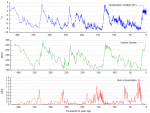In essence, I accept that we have taken a slow, natural warming process, that the planet is currently undergoing, and artificially ramped it up to geologically breakneck speeds. Subsequently, changes are occuring at a far greater pace than the environment, and nature, are capable of adjusting to. This makes the current warming cycle 'unnatural' in nature.
...except we are not in a natural warming cycle, we're in a natural cooling cycle...but we're still warming.
http://ossfoundation.us/projects/environment/global-warming/natural-cycleWhere are we currently in the natural cycle (Milankovitch cycle)? The warmest point of the last cycle was around 10,000 years ago, at the peak of the Holocene. Since then, there has been an overall cooling trend, consistent with a continuation of the natural cycle, and this cooling would continue for thousands of years into the future if all else remained the same. But since 1750 however, the CO2 content of the atmosphere has deviated from the natural cycle. Instead of decreasing, it has increased because of the fossil-fuel burning. Methane and nitrous oxide have also increased unnaturally because of agricultural practices and other factors. The world has also warmed unnaturally. We are now deviating from the natural cycle.
For example, we are warming far too fast to be coming out of the last ice age, and the Milankovitch cycles that drive glaciation show that we should be, in fact, very slowly going into a new ice age (but anthropogenic warming is virtually certain to offset that influence).
The "1500-year cycle" that S. Fred Singer attributes warming to is, in fact, a change in distribution of thermal energy between the poles, not a net increase in global temperature, which is what we observe now.
The Little Ice Age following the Medieval Warm Period ended due to a slight increase in solar output (changes in both thermohaline circulation and volcanic activity also contributed), but that increase has since reversed, and global temperature and solar activity are now going in opposite directions. This also explains why the 11-year solar cycle could not be causing global warming.
http://www.skepticalscience.com/global-warming-natural-cycle.htm
Last edited:




